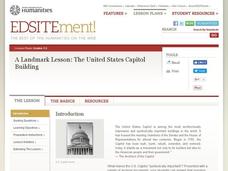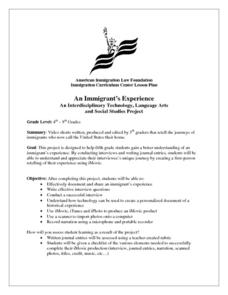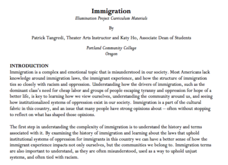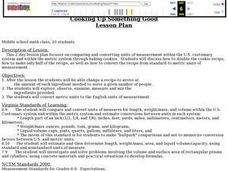C-SPAN
How A Bill Becomes A Law
Seven steps are required for a bill to become a United States law. The Families First Coronavirus Response Act (H.R. 6201) is used as a model for the process of how a bill becomes a law. Class members work independently through a Google...
Curated OER
Book: Crossing the Seas
As learners read each chapter of Eric Schwartz's Crossing the Seas, they analyze the actions of United States in Venezuela, Hawaii, Cuba, the Philippines, Puerto Rico, and the intent of the Monroe Doctrine. They then compare American...
Alabama Department of Archives and History
Alabama's Secession in 1861: Embraced with Joy and Great Confidence. Why?
From December 20, 1860 to June 8, 1861, eleven states seceded from the Union. Alabama seceded on January 11, 1861. Why did so many white Alabamians want to secede? Why did they believe the South could win the war? These are the essential...
Advocates for Human Rights
Undocumented Immigrants
Stay or go? As part of a study of immigration and human rights, class members listen to the stories of several immigrants and must decide if the story was their own if they would stay in the United States as an undocumented immigrant or...
ThoughtCo
Thomas Jefferson Crossword Puzzle
What was the name of the house Thomas Jefferson designed? Where was Thomas Jefferson born? Complete a crossword puzzle centered around the third president of the United States.
Judicial Learning Center
Law and the Rule of Law
We hear a lot about the importance of the rule of law, but most people do not really know what those words mean. The lesson is a webpage that defines the rule of law, explains why it is important in a democratic society and provides...
Curated OER
A Landmark Lesson: The United States Capitol Building
Students study the events in American history that affected the US Capitol Building. They name activities that happen in and around the Capitol by looking at primary source documents that are available online.
iCivics
You've Got Rights!
If aliens invaders nearly destroy the world in the distant future and leaders must decide on a pamphlet of protections to preserve individual rights, what should they include? Introduce the Bill of Rights and the struggle between the...
American Immigration Law Foundation
An Immigrant’s Experience
After interviewing an immigrant about their voyage to the United States and first impressions of the country, young learners create a fictional series of journal entries and design an iMovie depicting their interviewee's story.
Mrs. Hodges' Social Studies Classes
I Have Rights?!
Do young people have rights in the United States? Your pupils will not only learn the answer to this important question, but will also build vocabulary through cloze activities and gain a thorough introduction to the Bill of Rights.
Curated OER
Civil War Literature Circle
Historical fiction can be a valuable asset when learning about the past. Integrate several novels written about the Civil War into your social studies unit, with groups of four working collaboratively to comprehend the novel from...
Museum of Tolerance
Disenfranchised People of the New Nation
Why are some immigrant groups in the United States embraced while others become disenfranchised? To answer this question, teams investigate why groups emigrated to the US, why some of these these peoples were disenfranchised, and their...
Advocates for Human Rights
Refugees and Asylum Seekers
To gain a deeper understanding of the plight of refugees and asylum seekers, class members read stories written from the point of view of an emigrant, map the individual's journey, and note the human rights affected by each stage of the...
Curated OER
Immigration Illumination Project Curriculum Materials
Gain an understanding of the complex topic of immigration with a collection of resources. Class members engage in a series of activities designed to give them insight into the factors that influence immigration policies and the effects...
ProCon
President Bill Clinton
Was Bill Clinton a good president? Scholars set out to answer the question as they prepare for a class debate on the topic. They watch videos, review pros and cons, and read facts about the process of becoming a United States president....
ProCon
President Ronald Reagan
At 69 years old, Ronald Reagan was the oldest man ever to be elected president in the United States. After reviewing a thorough history of Reagan's presidency, pupils read the main pro and con arguments to determine if he was a good...
Concord Consortium
People and Places
Graph growth in the US. Given population and area data for the United States for a period of 200 years, class members create graphs to interpret the growth over time. Graphs include population, area, population density, and population...
Stanford University
Iraq Resolution
The 9/11 attacks propelled the United States into a period of low-grade war that has existed from that day all the way to current times. By looking at documents from the decision to send troops to Iraq in 2006, scholars connect the...
C-SPAN
Choice Board: Expressed and Implied Powers
Article 1, Section 8 of the United States Constitution expressly lists powers given to Congress. Over the years, lawmakers have expanded the enumerated powers to include powers implied by the list. To better understand the significance...
Curated OER
Cooking Up Something Good
Students compare and convert units of measurement within the United States customary system and within the metric system by baking cookies. Students discuss how to double the cookie recipe, how to make only half of the recipe, and how to...
Center for Civic Education
Constitution Day Rap
Engage your class while learning about the US Constitution with this fun primary grade social studies lesson. After viewing a picture of the US Constitution, young learners piece together a US flag using stars and stripes with facts...
Curated OER
La Leyenda de Betsy Ross
Is your native Spanish-speaking class learning about American legends and the history of the United States? Introduce them to Betsy Ross, the woman often credited for the making of the first American flag! After reading the short...
EngageNY
Mid-Unit Assessment: Analyzing an Informational Text about a Refugee Experience
Refugee & Immigrant Transitions is an organization that helps newcomers adjust to life in the United States through education and community leadership opportunities. As part of a mid-unit assessment, pupils independently read a...
EngageNY
Mid-Unit Assessment: Evidence, Ideas, and Interactions in “Why Couldn’t Snow White Be Chinese?”
The class is halfway there! Pupils complete a mid-unit assessment by answering questions in Evidence, Ideas, and Interactions in Why Couldn’t Snow White Be Chinese? Readers then work with partners to analyze the 2010 Census: United...
Other popular searches
- United States History
- United States Maps
- Constitution United States
- United States Government
- United States Immigration
- United States Regions
- United States Armed Forces
- United States Reconstruction
- United States Geography
- United States Judicial Branch
- United States Map Skills
- United States Executive Branch

























